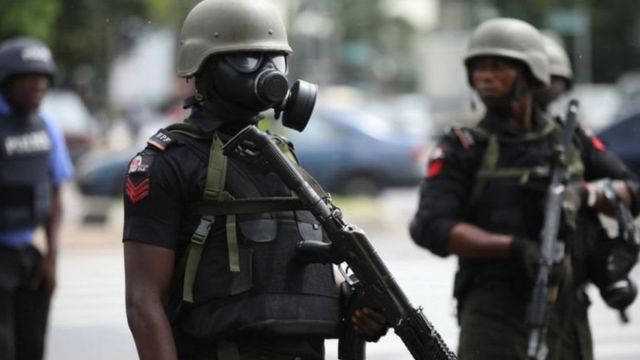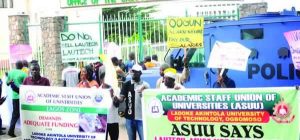
Security of lives and properties in Nigeria has become a private affair. Many streets and townships are guarded by community-funded security. In many areas located near police stations, cases of armed robbery had been reported and mostly under-reported. There is a palpable loss of confidence in the Nigeria Police. Many victims of crime have complained about how police officers extort money when they make formal police reports. During the last nationwide lockdown, many communities in Lagos were thrown into fear when some organised armed bandits wreaked havoc in some homes. Calm was restored when community effort matched by those of the Nigeria Police and some members of the Nigerian army mounted some semblance of fortitude at some flashpoints in Lagos.
From the report titled ‘Camouflaged Cash: How ‘Security Votes’ Fuel Corruption in Nigeria’ ’ documented by Transparency International Defence and Security (TI-DS) and Civil Society Legislative Advocacy Centre (CISLAC), it is estimated that a sum of N241.8 billion ($670 million) is being spent annually by the federal government as ‘security votes’ in a most untransparent manner. In addition, the report revealed that while the 2018 defence budget is estimated to be some $1.2 billion, more than $670 million extra was being handed out annually without proper oversight.
Clearly, this explains why many police stations are poorly funded. The patrol vehicles are mostly in a state of disrepair; officers complain about funds for proper investigations of criminal acts. Meanwhile, some police stations are painted and maintained by corporate organizations- a situation which begs the question of what happens to the enormous state security funds.
Public apathy towards Nigeria Police is further boosted by the constant harassment of citizens especially young men by some security personnel purporting to be conducting routine security checks. Many Nigerians have shared stories of how members of the Special Anti-Robbery Squad (SARS) have conducted unlawful arrests, intimidated, extorted and humiliated them on problematic grounds of profiling. Recently, a Nigerian model and Jenifa’s Diary actor, Odjegba Oghenekaro Kay with the moniker Kay Ojay revealed how he was extorted by men of SARS who were stationed near Ajah, Lekki-Epe Expressway.
According to Ojay, he was on his way to Rave TV for an interview when he was accosted by the policemen who accused him of being in possession of Indian Hemp.
‘I did a job for someone’s TV that is Jenifa’s Diary. The character I played was a very intelligent one. So, different media houses have been calling me for interview. Yesterday, I had an appointment with the Rave TV to talk about my journey as an actor and about the role I played in Jenifa’s Diary.’
Read Also: “We Are Back!”- The Nigeria Police Roars
While waiting at the bus stop for his ride, a SARS officer approached him. After exchanging greetings, he showed the officer his international passport which was the only form of identification that he was carrying.
The officer requested to see the contents of his bag and then his pockets.
‘As I dipped my hand in my left pocket, he dipped his hand in my right pocket. To my greatest surprise, he brought out weed. Next, he put his hands on my waist and from my belt, he dragged me like a criminal. I didn’t struggle with them and I was trying to explain myself all to no avail,’ he recounted.
Afterwards, three officers joined them and dragged him into their shuttle van that was parked on the other side of the road. Ojay claimed that he was slapped and dragged like a criminal before his phones were seized from him. He was later allowed to call his friend who paid N20,000 after the initial charge of N100,000 with a threat to hold him in custody for refusal to pay.
‘It was a traumatic experience. They took N20,000 from me then another N4,000. Even my show which was scheduled to be live for 1pm, I couldn’t meet up with the time, I got there at about 4pm and it was pre-recorded. SARZ men stole from me. They stole my money and harassed me, treated me like a criminal,’ he bemoaned.
Meanwhile, this is one of many stories. This manner of unlawful arrests had led to a social media outrage that gave birth to the #EndSARS movement. End Special Anti-Robbery Squad (ENDSARS) is the resulting advocacy group opposing the Special Anti-Robbery Squad, demanding for Nigerian government to scrap and end the deployment of Nigeria Police Force Special Anti-Robbery Squad, popularly known as SARS.
A petition signed by 10,195 people was submitted to Nigeria’s National Assembly calling for scrapping of SARS. Although there had been talks about Police reform with many non-governmental organizations engaging stakeholders in workshops to build capacity in human relations and public engagement. Some popular entertainers had been victims of police harassment: Lil Kesh, Adekunle Gold, Tjan amongst others. Others added their voice to the EndSARS movement. In a tweet, DJ Spinall spoke on how SARS arrest young people for flimsy reasons.
‘Basically, #SARS and most policemen instantly assume you are a fraudster if you are pushing a good car. The treatment is usually worse if you got all the boys in the car and hell comes down if you are wearing blings or shades.’
Another popular actor known as Ebuka revealed that his near-death experience in the hands of the men of SARS in 2005 in his tweet.
Read Also: Enhanced Package for The Police: Vital Step in Tackling Insecurity
‘Can never forget November 2005, driving in Abuja with @sommbonu and @IAMOfem. Stopped by a plainclothes officer with a gun. Chased and actually being shot at for being ‘suspected armed robbers’ . Ofem still has the bullet scars on his shoulder,’ he revealed.
Such stories are rife. But does that mean that the Nigeria Police cannot curb crime? Sadly, many police officers are ill-equipped to fight crime. They usually have low-grade if not out-moded weapons to tackle high-calibre weapons that the criminals brandish.
Interestingly, some good stories had been shared about some arrests of criminals by the Rapid Response Squad (RRS) Unit of the Nigeria Police. Formerly called Operation Sweep, it was set up by the Lagos State Police Command to respond speedily to emergencies within the state. Many states in Nigeria have since replicated this state security apparatus to reinforce effective policing. In addition, other community-based security personnel work with them to ensure that criminals and suspects are arrested.
Still, a regional security outfit known as Amotekun stirred arguments and public debates on its legality. Amotekun is an initiative of the six South-West states to establish the Western Nigeria Security Network in 2019 which was frowned upon by Attorney-General of the Federation and Minister of Justice, Abububar Malami. After much media attention on the legality of Amotekun, the governors of the six states were to work out the legal framework for Amotekun in their individual state house of Assembly. Recently, the Ondo State Governor has inaugurated the pioneer officers of Ondo State Security Network Agency Amotekun Corps, joining other states in this new movement towards reinforcing security at the grass-root level.
Aside from the inefficiency of the security agencies, the judiciary has also been blamed for the failure of the criminal justice system thus contributing to the state of impunity. Many criminals are emboldened by the reality that they can get away with any crime.
Unemployment has been listed amongst the leading causes of insecurity. Every year, the labour market is besieged by fresh graduates who are too large for the number of available jobs. Nepotism has shrunk the possibility of qualified candidates securing jobs on merit. Also, there is a growing population of unskilled youths who roam the streets in daytime as beggars and night time as robbers. Also, kidnapping cases had been on the rise with persons related to distinguished Nigerians targeted by kidnappers.
Radical change in value has also been recorded in many households. Nowadays, parents are indifferent to how their children make money. They as well as the society at large celebrate material success and ostentatious lifestyles at the expense of morals. Some youths have reportedly got involved in online fraud through romance and corporate scams.
Nigeria’s public image on the world stage has also been marred by the incessessant crises in the North-east region where terrorists’ attacks abound. Many countries issue travel advisory to their nationals who intend to visit Nigeria on the lingering security crises in Nigeria which had not been resolved, contrary to report from some government sources.
The path towards changing the narrative for Nigeria’s security will pass through the streams of reorientation, training, mentoring programmes, and international exchange programmes. It would also involve the art of improvisation and management of resources, acquisition of crime-fighting tech-devices among others. Our film industry should be tasked on producing creative content that will change the perspective of Nigeria Police from being authoritative in their dealings with crime victims to being sensitive to public complaints.
Also, the corruption in the security votes allocation and appropriation must be matched by serious consequences for anyone found guilty. This media trial and social media-led mockery do not suffice for diligent prosecution of corrupt government officials. Without a transparent funding for the Nigeria Police and other military and paramilitary outfits, the talk on reform will remain a ‘beer parlor’ discussion.
Freda Onaiza
Writer and Media Consultant

